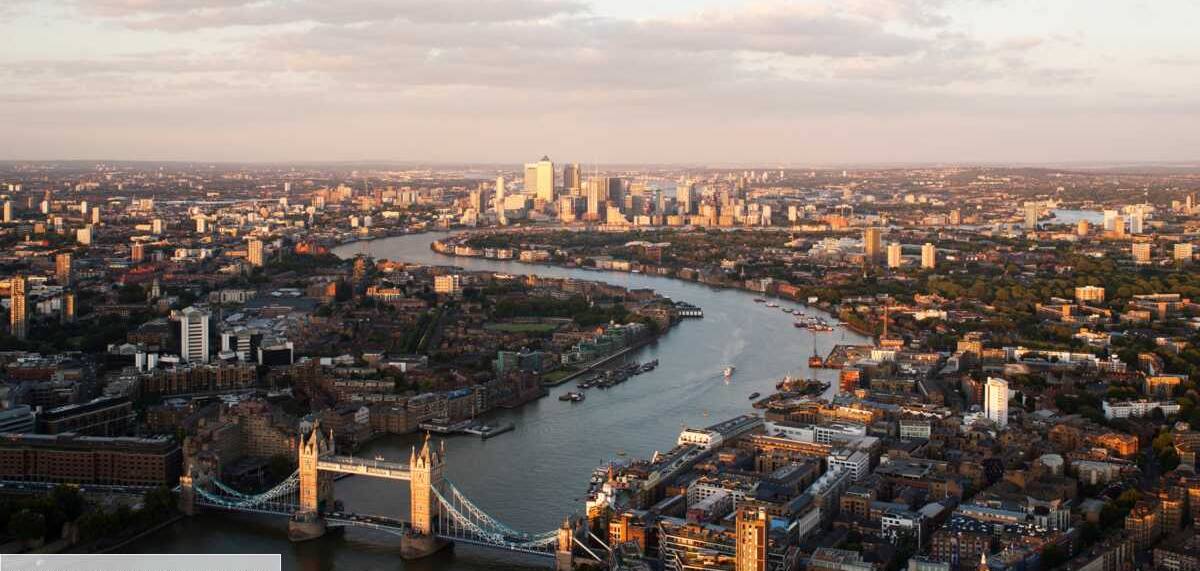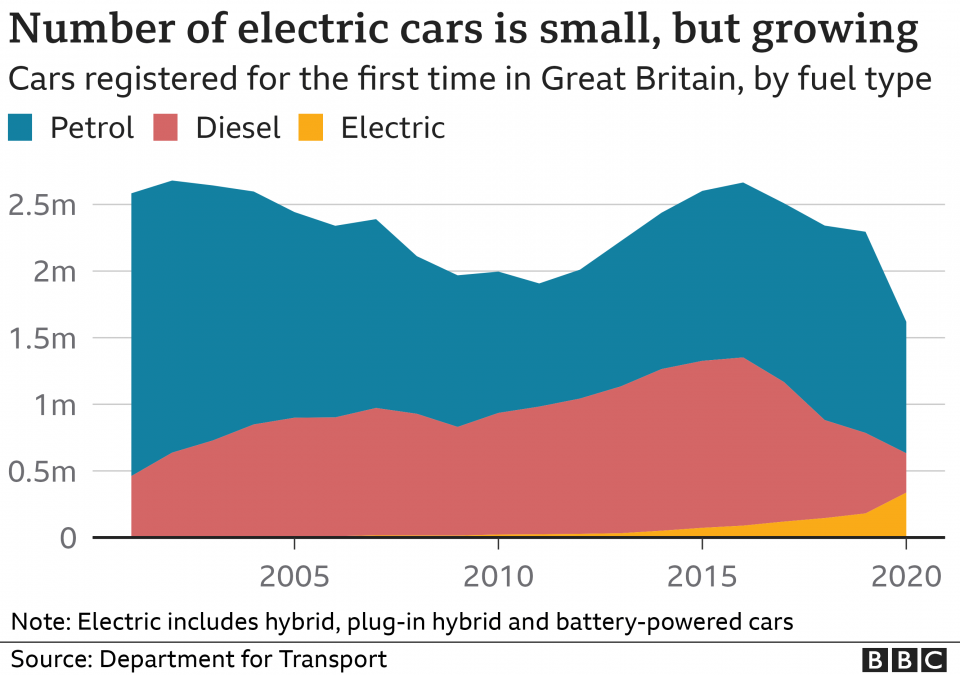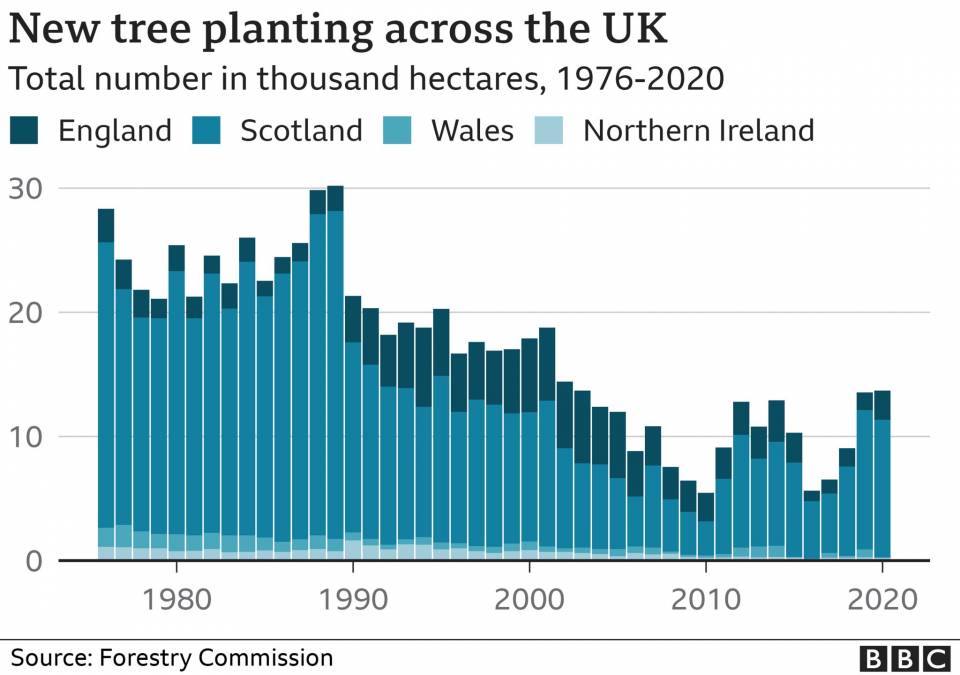
Net zero is the point at which the country absorbs as many of these climate-altering gases from the atmosphere as it emits from them.
As part of this pledge, the government strived to reduce emissions by 78% by 2035, from 1990 levels.
But a group of experts advising the government say Boris Johnson's government has put in place credible policies to achieve only about a fifth of that reduction.
Electricity production.
Successive governments have relatively successful at reducing emissions from energy - they fell by 40% between 1990 and 2019, much of this being achieved by the closure of coal and increased spending in solar, wind and nuclear energy.
The UK is a world leader in offshore wind. It currently has a capacity of around 10 MW, which the government has promised to quadruple by 2030. An increase to 40 MW would generate enough energy to power every home in the UK.
The increase is achievable, but energy companies fear that the price they pay for wind power will drop quickly, reducing their income and could limit further investment.
The Climate Change Committee (CCC) also informed the government that all high carbon and uncaptured gas-fired power plants are expected to be phased out by 2035, but no decision has been made.
Cars, buses, trains and bicycles.
Cars and taxis accounted for 16% of UK emissions in 2019 and, in order to reduce this, the government says no new car gasoline and diesel will be sold from 2030.
Electric car sales are growing rapidly - just over 10% of cars sold in 2020 were electric, up from 2.5% in 2018.
The government has not introduced a scrapping program to encourage people to buy electric vehicles, but a grant of £ 2,500 (€ 2,920) is available for fully electric cars costing less than 35,000 £ (€ 38,550).
The switch to electric will also require a considerable growth in publicly accessible charging points. Their numbers have grown, but not fast enough last year to keep up with the growing number of electric vehicles.

Britain now has about 25,000 charging points, but the Competition Authority and the market says it might need 10 times before 2030.
To encourage people to ditch their cars, the government has pledged to double bicycle premiums by 2025 and build a "world-class" cycling network by 2040.
He spent £ 338million (€ 395million) on walking and cycling infrastructure in England.
Aviation and maritime transport.
Before the pandemic, flights accounted for around 7% of total emissions and shipping around 3%, but we don't know much about how the government plans to reduce them and there are no targets. specific for these sectors.
The CCC says the government must freeze demand for flights and should release a strategy to reduce emissions from freight, aviation and shipping.
But the government says people can continue to fly, and says technology that has yet to be developed should allow domestic flights to be nearly emission-free by 2040 and aviation. to be near zero carbon by the middle of the century.
Heating and buildings.
There is no overall government strategy on heating and buildings, while a strategy is expected soon.
Housing accounts for around 14% of the UK's greenhouse gas emissions, mainly due to gas boiler heating systems and poor insulation, the CCC says.
The government has committed to installing 600,000 heat pumps per year by 2028. These transfer heat from the ground, air or water around a property into its heating system. Prices for such a process start at £ 6,000 (€ 7,000).
The CCC says the target should be 900,000 heat pumps per year.
Around 35,000 were installed in the UK in 2019 - in comparison, around 1.7 million gas boilers are sold in the UK each year.
The CCC also says insulation rates are only about a third of what they should be to reduce energy use. Earlier this year, the government abandoned its grant program meant to help people insulate their homes - but he promised a new one.
Food.
The CCC says emissions from agriculture must be reduced by 30% between 2019 and 2035.
This would mean:
- Eat 20% less meat and dairy products on average by 2030
- Transfer of land from agricultural use to restored trees and peatlands
- Less food waste
The government has yet to release the part of its food strategy that examines the environmental impact of people's diets.
The CCC says there are signs consumers would be ready to change their eating patterns, but meat consumption has been relatively stable over the past 30 years.
Trees.
Trees have an important role in the removal of atmospheric carbon emissions - and the government has an ambitious goal of planting 30,000 hectares of trees per year by 2025 (one hectare is slightly taller than 'a football field).
Annual tree planting was close to this figure in the late 1980s (most in Scotland), but it has not exceeded 15,000 hectares UK-wide since 2001.

Planting trees is a decentralized matter, and Scotland has nearly twice the coverage of England.
The government wants to triple plantings in England in this legislature, but overall it has a lot of ground to catch up by 2025. Strong acceleration will be needed to achieve that goal, and there are questions about how the trees will be maintained after they are planted.
Hydrogen.
Hydrogen is a low-carbon fuel that could be used for transportation, heating, power generation or energy storage - and the government wants to be able to produce 5 MW per year of by 2030.
But in an industry in its infancy - there is hardly any low-carbon hydrogen production in the UK or around the world at the moment - this ambition is quite difficult to assess.
The government admits it will need a "making rapid and significant scale" in the coming years.
- Is the “revolution” in hydrogen technology a hope or a hype?
- Can hydrogen contribute to a green future?
Questions that many governments are asking themselves in order to choose the right direction.
Carbon capture and storage.
The ability to capture carbon before it is released or out of the atmosphere and store it will be critical for the UK to reach net zero by 2050.
The government aims to capture and store 10 million tonnes of CO2 per year by 2030 - but the CCC says it should aim for more than double that amount.
The biggest challenge is that the technology is still emerging and remains very expensive.
But some projects are planned, one in the northeast of Scotland that can extract as much CO2 from the air 40 million trees.
Industry
The government says it will reduce emissions from the building sector about two-thirds from 2018 to 2035.
Both carbon capture and the switch to hydrogen will play an important role, but considerable progress is needed in these technologies.
The government also plans to cap the amount of emissions allowed by different sectors each year, which will decrease over time.
But the question remains as to how the system will protect itself against the simple transfer of production and emissions to other countries.
Posted on 2021-10-04 07:00








Comments